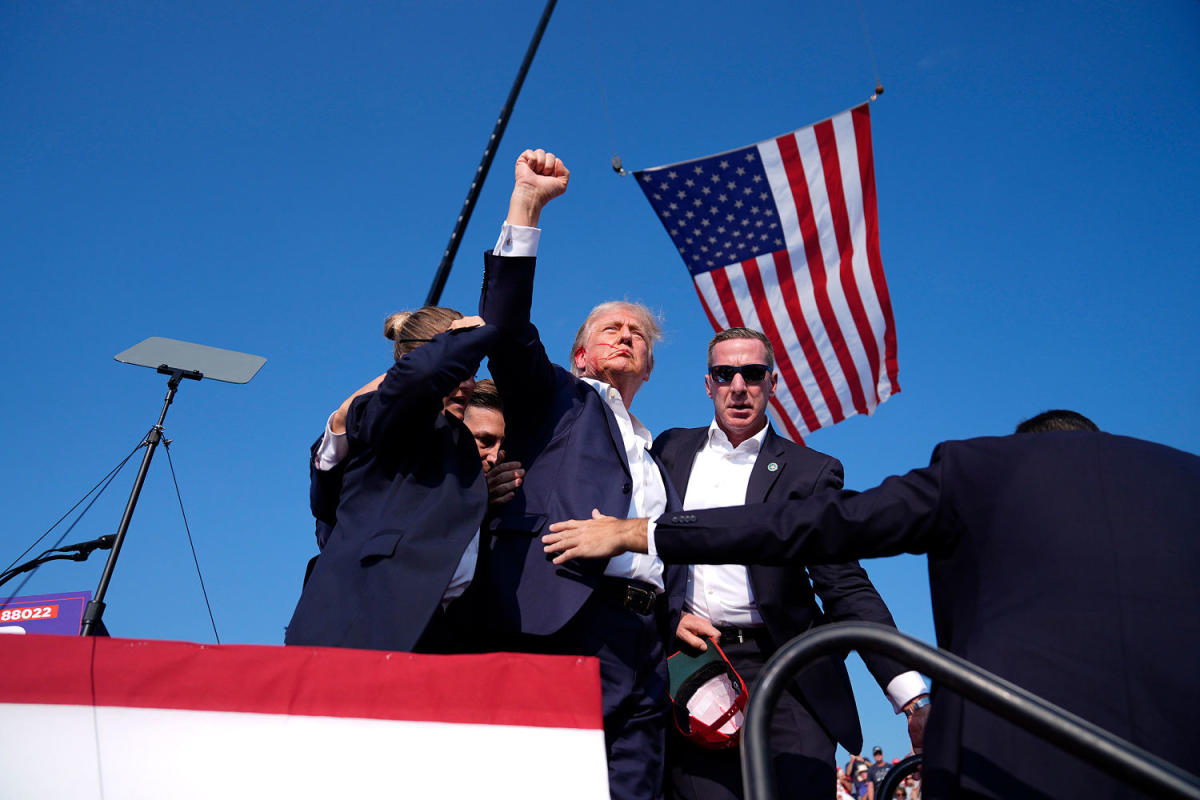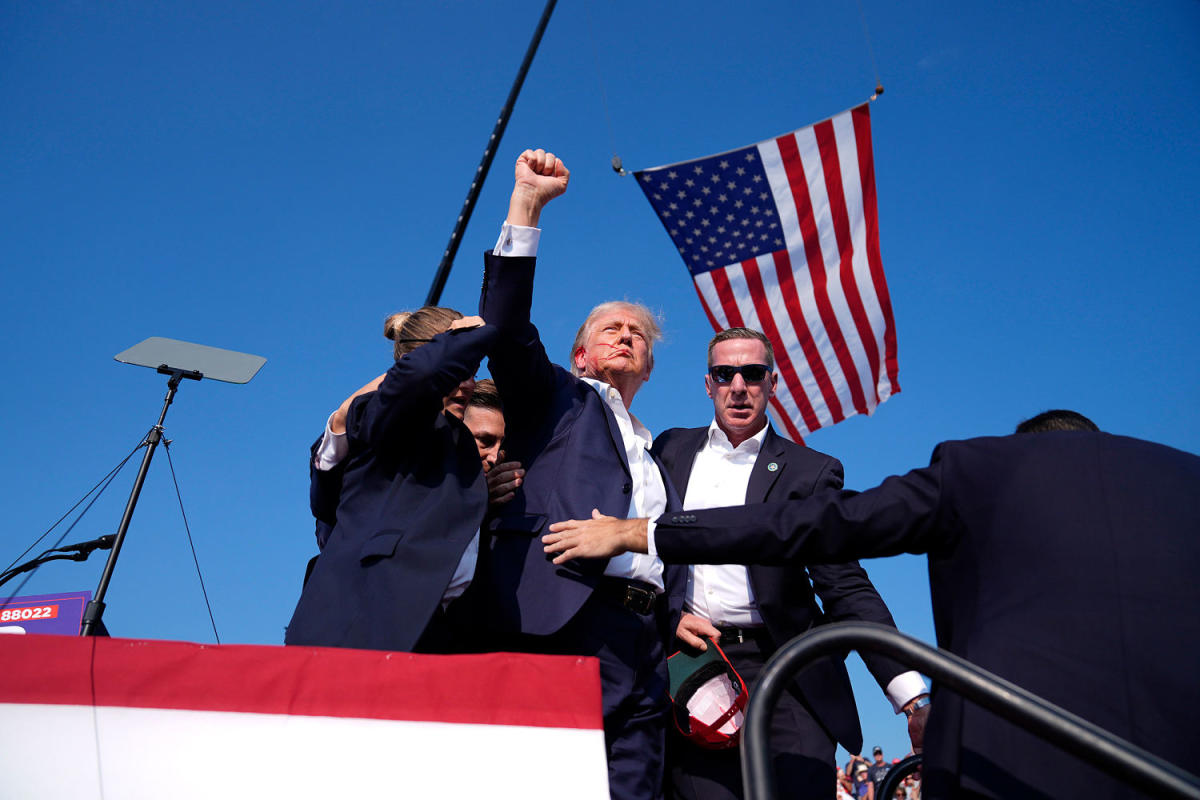
BUTLER, Pa. — A day after the shocking assassination attempt on former President Donald Trump at a campaign rally in Pennsylvania, the nation is left wondering whether the political polarization that has gripped the country has grown too severe.
Condolences and calls to turn down the rhetorical heat poured in from across the country and the world as leaders of all political stripes expressed shock and horror at the first shooting of a U.S. president since Ronald Reagan was nearly killed more than 40 years ago while leaving a hotel in Washington.
In a prime-time Oval Office address Sunday night, President Joe Biden urged Americans to “lower the temperature in our politics.”
“While we may disagree, we are not enemies,” Biden said during his approximately six minutes of remarks condemning the attempted assassination on his predecessor. “We’re neighbors, we’re friends, coworkers, citizens, and most importantly, we are fellow Americans. We must stand together.”
The president said that he was “grateful” that Trump was doing well, and he expressed condolences for the rally attendee who was killed.
“A former president was shot, an American citizen killed while simply exercising his freedom to support the candidate of his choosing,” Biden said. “We cannot, we must not go down this road in America.”
“Disagreement is inevitable in American democracy,” Biden added later, emphasizing that politics should never turn into a “killing field.”
The president said that Americans should resolve disagreements at the ballot box, “not with bullets.” He urged unity, adding, “We can do this.”
“We’re all Americans, and we have to treat one another with dignity and respect,” House Speaker Mike Johnson said in an interview Sunday on NBC News’ “Weekend Today.” He went on to echo the blame that Trump allies are placing on Biden, who used the word “bull’s-eye” on a campaign call with donors last week.
“I mean, I know that he didn’t mean what is being implied there,” Johnson said Sunday about Biden’s comments, but added, “That kind of language on either side should be called out.”
Violence tends to beget more violence and experts fear the shooting will inflame, rather than calm, tensions heading into a presidential campaign whose stakes are seen as existential by both sides.
“This is a very dark moment in our history, and unfortunately this is very unlikely to be the end of political violence this election season,” said Jacob Ware, a research fellow at the Council on Foreign Relations who studies domestic and international terrorism. “A whole range of scenarios, from low-level vigilante violence to higher-profile assassination attempts, will likely characterize the next several months.”
Once violence becomes seen as a legitimate avenue to settle political scores, “it’s difficult to know how to reverse that development,” Ware added.
Violent rhetoric has become a more familiar part of political campaigns in recent years, as has sometimes violent clashes between protesters, counter-protesters and police. But assassinations have not been seen in American politics for decades.
Trump, who was hit in the ear by a bullet, was released from the hospital Saturday night, while two spectators who were seriously injured remain hospitalized. Another spectator was killed.
The two injured rally attendees are in stable condition, according to the Pennsylvania State Police.
“In this moment, it is more important than ever that we stand United, and show our True Character as Americans, remaining Strong and Determined, and not allowing Evil to Win,” Trump wrote on the website Truth Social on Sunday morning.
Biden also urged unity during his Oval Office address and earlier remarks at the White House on Sunday.
“Here in America, while unity is the most elusive of all goals right now, nothing is more important for us now than standing together,” Biden said Sunday night.
How the shooting unfolded
Witnesses at the rally described a chaotic scene in the moments after the shooting.
In the front row of the rally, attendees heard a series of pops and saw Secret Service agents jump on the stage. One, who identified herself as Erin, told NBC News that she saw blood on Trump’s ear. She did not fear for her own safety, she said. “We were only concerned about him,” she said, referring to Trump.
Investigators have yet to say how the shooter, identified by the FBI as 20-year-old Thomas Matthew Crooks of Bethel Park, Pennsylvania, was able to get close enough to shoot at Trump.
Police have also not suggested a motive for Crooks, who was killed by police moments after he opened fire. Voter registration records show that Crooks was a registered Republican, but so far, authorities have offered no political motivations for the shooting.
The FBI is investigating the attack as potential domestic terrorism and an assassination attempt, according to a statement, which noted that the investigation indicates that the shooter acted alone.
The FBI said that the suspect was “not known to the FBI prior to this incident.” FBI Pittsburgh Special Agent in Charge Kevin Rojek said earlier that there were no indications that the suspect had mental health issues.
The weapon allegedly used by Crooks was found at the crime scene, Rojek said. The firearm was “purchased legally,” according to the FBI.
The FBI said the bureau found “suspicious devices” in the suspect’s home and vehicle. The devices were “rendered safe by bomb technicians and are being evaluated at the FBI Laboratory.”
The FBI also obtained the shooter’s phone for examination, according to the statement.
Some prominent Republicans pointed to Biden’s rhetoric at the motivation before the shooter was even identified. Biden’s allies pushed back, pointing to the number of times the sitting president has condemned political violence.
Experts cautioned to not jump to partisan conclusions about Crooks’ motive, noting that shooters often struggle with mental illness, which makes their motives unintelligible to the rest of the world. Reagan’s would-be assassin, John Hinckley, has said he was trying to impress actress Jodie Foster after being infatuated with her performance in the film Taxi Driver. The man who shot former Rep. Gabby Giffords, Jared Loughner, was diagnosed with paranoid schizophrenia and his writings espoused what one scholar called a “toxic jumble of left- and right-wing conspiracy theories, his sources ranging from Marx to Hitler to heavy metal.”
Anthony Guglielmi, chief of communications for the U.S. Secret Service, pushed back on assertions that Trump’s campaign had requested but been denied additional resources.
“There’s an untrue assertion that a member of the former President’s team requested additional security resources & that those were rebuffed,” he posted on X.
“This is absolutely false. In fact, we added protective resources & technology & capabilities as part of the increased campaign travel tempo.”
The chairman of the House Homeland Security Committee demanded answers from the Secret Service and their bosses at the Department of Homeland Security in a letter Sunday.
“The seriousness of this security failure and chilling moment in our nation’s history cannot be understated,” Rep. Mark E. Green, R-Tenn., wrote in the letter. “Had the bullet’s trajectory been slightly different, the assassination attempt on President Trump might have succeeded.”
A bipartisan group of House lawmakers quickly introduced a measure to enhance Secret Service protection for Trump and Biden, as well as grant it to independent presidential candidate Robert F. Kennedy, Jr., who has accused Biden of denying him official protection for political reasons. (The White House denied that, noting the Department of Homeland Security along with congressional leaders are responsible for such decisions.)
“Last night’s attempted assassination of former President Trump was a dark moment in our nation’s history. As reports continue to emerge, it’s clear that more protection is needed for all major candidates for president,” New York Reps. Mike Lawler, a Republican, and Ritchie Torres, a Democrat, said in a joint statement.
House Homeland Security Committee Chair Mark Green, R-Tenn., held a call on Sunday with Secret Service Director Kimberly Cheatle, according to a committee spokesperson.
Campaign season thrown into turmoil
The assassination attempt has upended a presidential campaign that was already in the grips of tumult, as fellow Democrats called on Biden to step aside after a debate performance last month left many wondering about the 81-year-old’s mental and physical fitness.
The Republican National Convention is set to begin Monday to formally nominate Trump.
Audrey Gibson-Cicchino, the Secret Service’s 2024 RNC coordinator, said during a Sunday press briefing that there are no changes to operational security plans for the convention.
Officials expressed confidence during the briefing that they are prepared for the convention, reiterating that it was already designated as a National Special Security Event, the highest federal security designation.
Still, Trump campaign officials advised staff to avoid the campaign’s offices in Florida and Washington, D.C., until their security can be assessed.
“It’s sick. It’s sick. It’s one of the reasons we have to unite this country,” Biden said in remarks late Saturday night, before he was able to speak with Trump. “We cannot condone this.”
First lady Jill Biden spoke over the phone with former first lady Melania Trump on Sunday, according to a White House official.
Former presidents Barack Obama, George W. Bush and Bill Clinton released similar statements condemning the attack and calling for unity, while foreign allies like new U.K. Prime Minister Keir Starmer said, “Political violence in any form has no place in our societies.”
Democratic National Committee Chair Jaime Harrison had a “brief call” with Republican National Committee Chair Michael Whatley on Saturday, according to a DNC spokesperson.
During the call, Harrison offered “his thoughts and condolences” and emphasized “the Democratic Party’s continued opposition to any and all forms of political violence,” according to the spokesperson.
Senate Minority Leader Mitch McConnell, R-Ky., told attendees at an RNC event that “we are not going to let this kind of hatred redefine this country,” according to a spokesperson.
David Brown, a Trump supporter from Pittsburgh, told NBC News on Sunday that like many Americans, he feels political animosity has gotten out of hand.
“We really need to take a deep breath,” Brown said. “I’m friends with a lot of Democrats, and they’re great people, but I think we need to realize that we’re demonizing each other too much… We need to look past that white noise, so to speak.”
On the other side of the aisle, Panfilo DiCenzo, a 40-year-old reluctant Democratic voter, saw the shooting as “a symptom of our current state, politically, socially.”
He pointed to political division and cultural and economic upheaval, saying it created “a lot of frustrated individuals.”
This article was originally published on NBCNews.com
EMEA Tribune is not involved in this news article, it is taken from our partners and or from the News Agencies. Copyright and Credit go to the News Agencies, email news@emeatribune.com Follow our WhatsApp verified Channel





